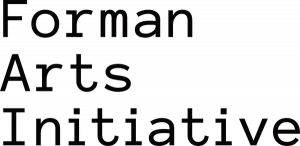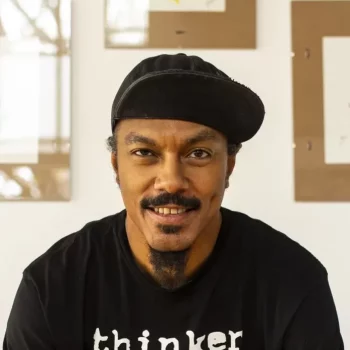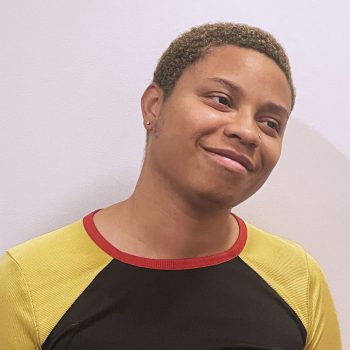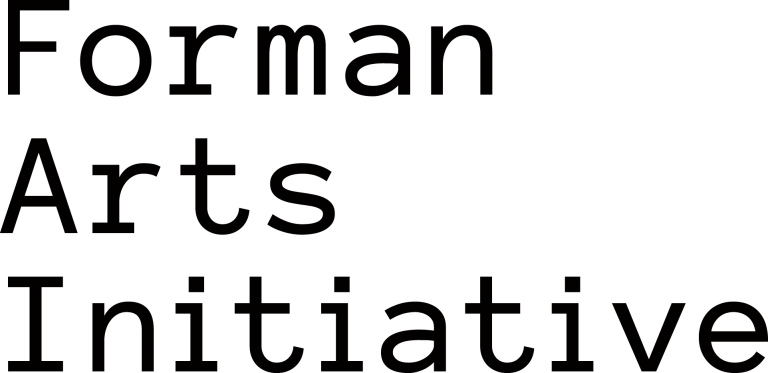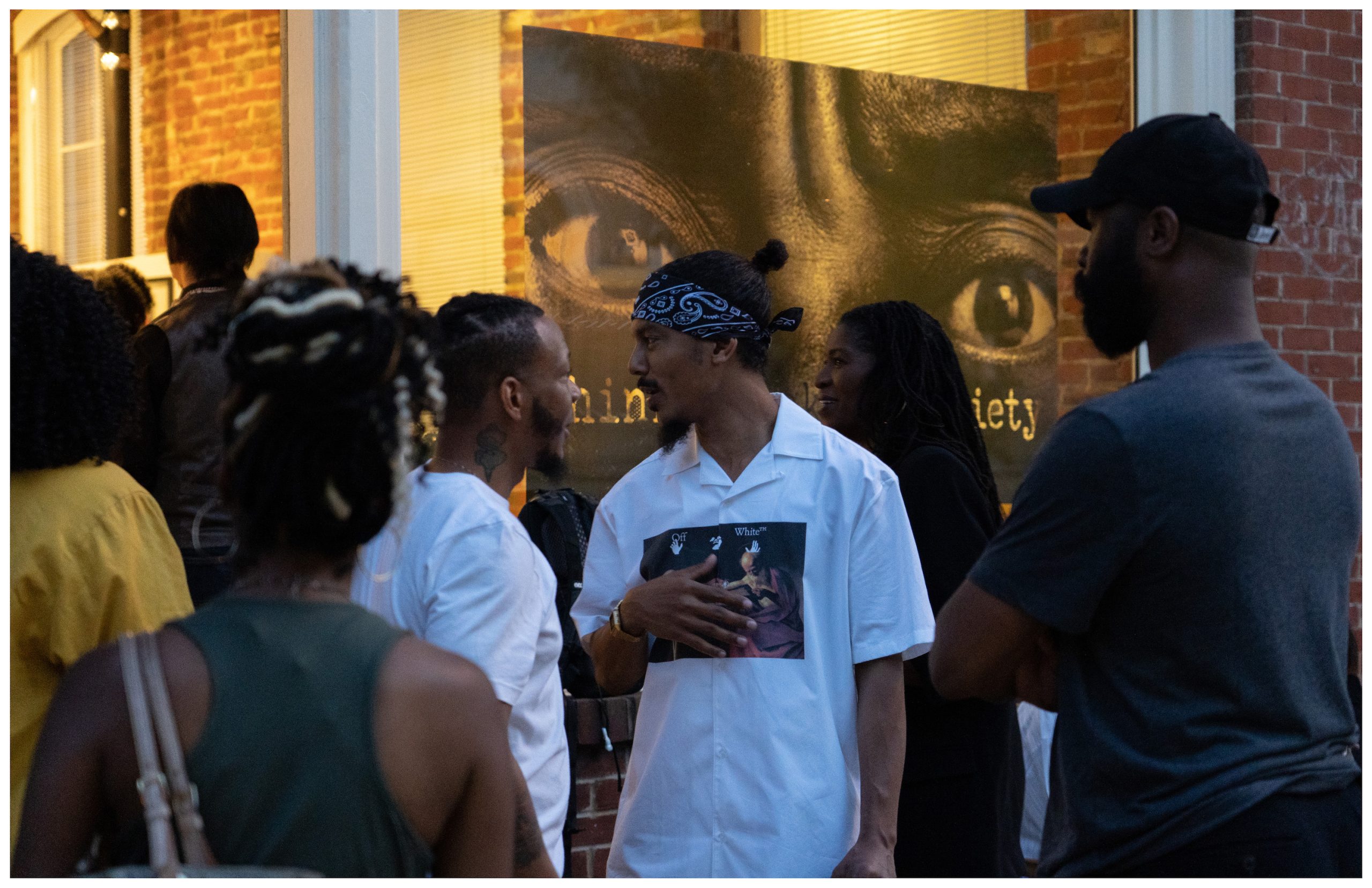
Quon Brinkley possesses the cool demeanor of someone who is able to dream big while still staying grounded in his environment. After living in various parts of the country and working various odd jobs, Brinkley returned to his native of Philadelphia and opened Thinker Makers Society, an art gallery and event space located in Old City. The gallery is a sophisticated space, both rooted in local art and elevated by Brinkley’s cultured taste.
The Thinker Maker Society occupies the first floor of a five-story apartment building at 3rd and Race. The gallery’s red brick walls and wooden ceiling gives Thinker Maker’s Society and established feel, even though the organization has only been in existence since 2021. Large windows let in sunlight, which highlight the curated shows framed onto the walls, as well as stocked bookshelves and a record collection. Almost everything there is reflective of Black arts and culture, from curated book selection to the R&B records being sold. As Thinker Makers Society’s website states, “We curate and host events grounded in the culture with a focus on forging the path forward. We are a society of brilliance and excellence.”
When beginning to formulate Thinker Makers Society, Brinkley states that he wanted to focus on making an art space that was more accessible to those who, like himself, at times feel like social outcasts in museum and gallery settings. He purposely located his gallery in Old City, a decades-long locus for Philadelphia art, the home of popular First Fridays, when galleries open their new shows to the public. Brinkley recalls attending First Fridays in his youth and is excited to continue the legacy of Philadelphia’s creative communities. His dream is to facilitate a new society in the city, one that supports the arts and where creators support each other through creative exchange.
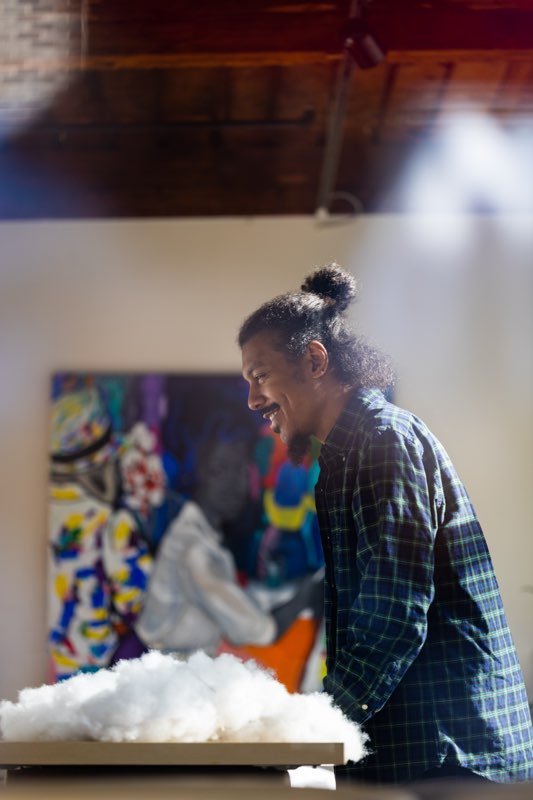
The gallery has so far been a success, which Brinkley attributes to its ability to “bring local artists of color, LGBTQIA artists all into the space where [they] can interact directly with the owner and [the owner] looks like you and talks like you,” he says.
Thinker Makers Society hosts a number of public and private events, including poetry readings, exhibitions, screenings, concerts, workshops, and pop-ups. Previous collaborators have included Jeff Rivers, The Future is Us Collective, Miti Mwonaji, Sooftheradiokid, Michelle Janāyea and Blues Babe Foundation.
Logan Cryer: How would you describe what Thinker Makers Society is?
Quon Brinkley: Think Makers Society is a lot of things: a physical space, art gallery, a space for the community where people come meet and engage with each other. We do a lot of different things here. It’s becoming a literal society I feel like. It’s becoming a community of different artists, people who enjoy the arts, people who do a little bit of everything.
LC: The location of Thinker Makers Society in Old City is so significant. Can you talk about how the importance of that neighborhood to the organization?
QB:If you’re from Philadelphia, you’re aware that Old City is the arts district — well, one of many art districts now. Other areas like Baltimore Ave are becoming a hub for art, even that whole strip of American Street. We’ve always been an art city, but Old City is one of the first areas to embrace it and do things like First Friday, which just recently celebrated its 30th anniversary. It’s dope to see similar things going on in the city like Second Thursday and people embracing and celebrating the arts a little bit more, which when I was growing up, we didn’t do enough of in Philly.
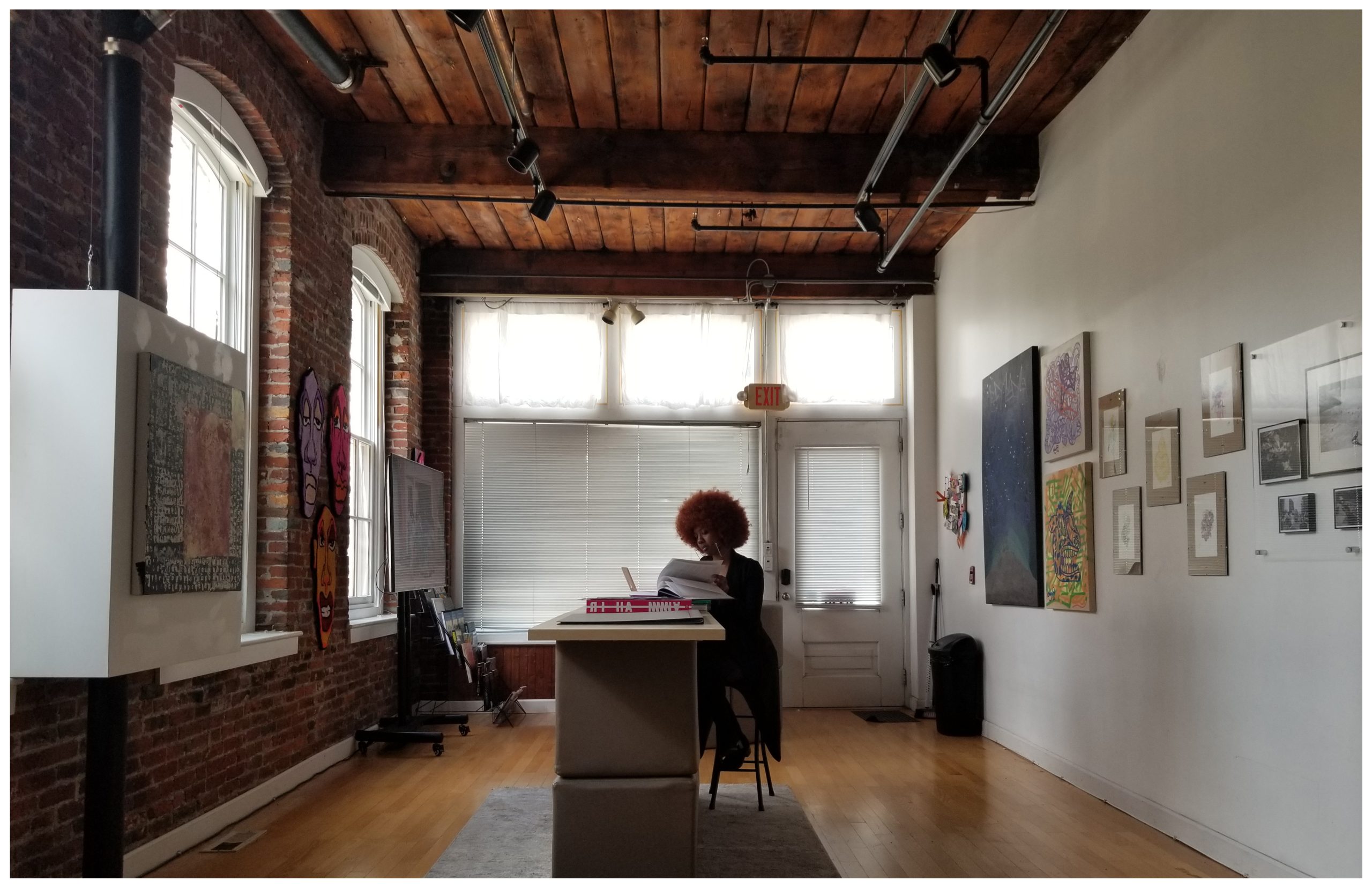
When I saw this space was available, I jumped at the chance to be in Old City because I remember as a teenager coming into Old City. It was a cheap date to be on. It’s got wine and cheese, show them you got a little culture. [Laughs.] I was excited at the opportunity to be in this area and bring a certain type of art that I felt was lacking.
LC: What does your space provide that you felt there was a lack of in the city?
QB: I would say a space that feels upscale in the environment but not pretentious in the vibe. You can come in here in a hoodie and sneakers but the vibe still feels upscale; for people of color by people of color. It can be a safe space where everybody is welcome. I’ve been to certain events with friends in different neighborhoods and we feel a level of discomfort. Just being able to provide an experience where no matter where you’re from, you can feel comfortable in that space.
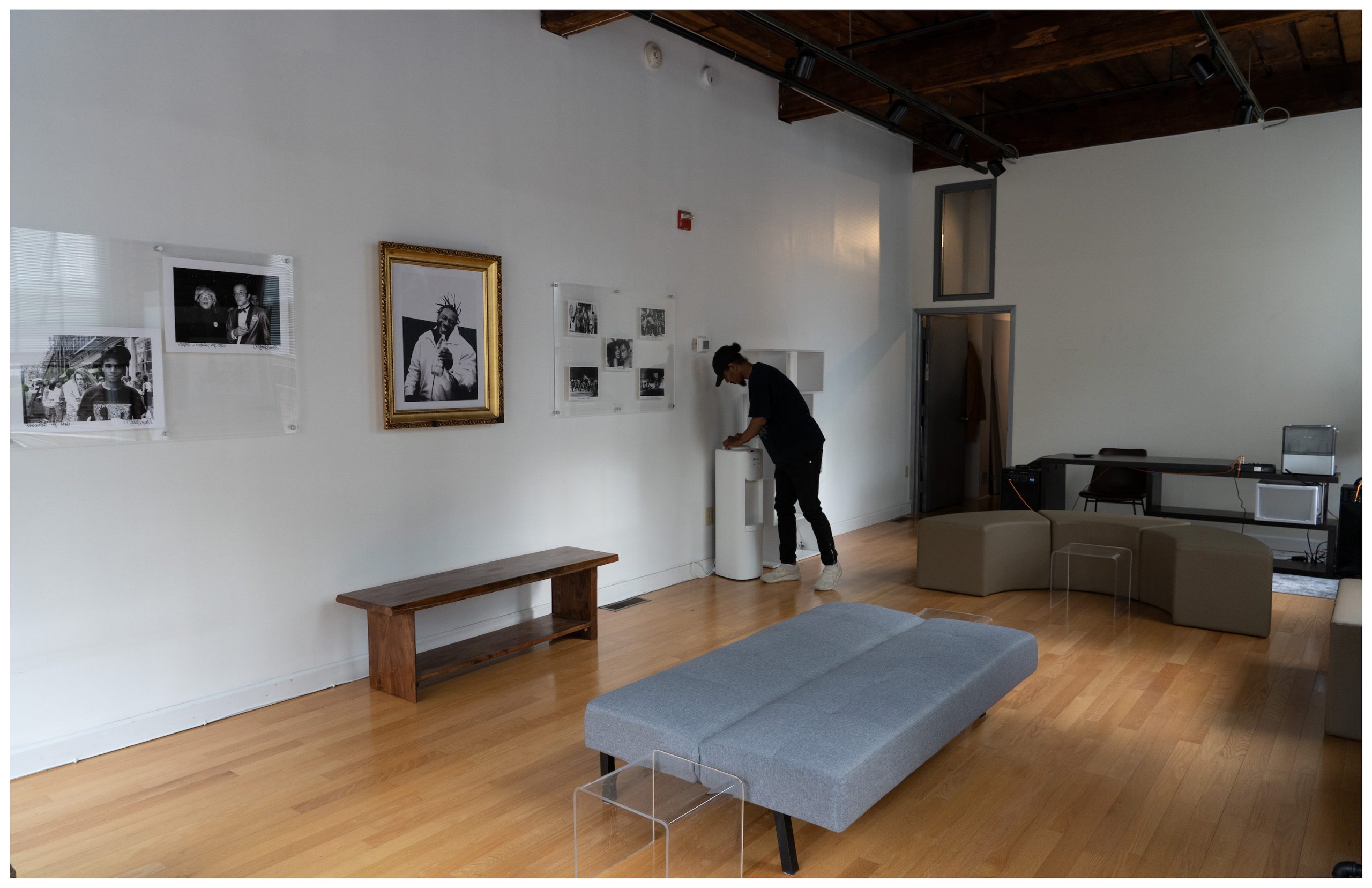
LC: I feel like a lot of that has to come from the fact that most art spaces in Philly aren’t run by people from Philly.
QB: That part. Yeah that’s a fact. It’s definitely a different energy.
LC: Have you always lived in Philadelphia?
QB: I lived in a lot of different places. Philadelphia born and raised … didn’t spend all my time on the playground. [Laughs] I’m from North Philadelphia but I was in the military so I traveled a lot when I was in the Army. I went to school in Chicago, had a good time out there. Maryland, which would be the other place I would say was a big influence on me. My mother is from Gary, Indiana so I spent my summers in Gary. That was influential, just to see that it was a different energy there. I’m from North so we had poverty but Gary had like poverty times ten. That influenced me. I would say outside of Philadelphia those would be my two main influences, Maryland, outside of Baltimore area, and Gary, Indiana.
LC: Where do you live now?
QB: I’m in Old City now. Still love North though.
LC: How did you get into the creative world? Was that something you grew up with?
QB: It’s definitely something I always grew up with. My parents were very encouraging. My father would allow us to literally draw on the wall. My mother wasn’t a fan of it! We were always encouraged to be creative. My father is an architect so he would have these drawings — you know this is pre everything-being-on-the-computer, so these blueprints would just be around the house. We’d go “Dad, what’s this?” and he’d always have paper and different colored pencils so there were always art supplies in the house. When he wasn’t around you could draw on his drawing board but if he caught you, it would be a problem. [Laughs.]
Then I got into hip-hop, early 90s hip-hop: Biggie, Pac, Wu-Tang. I was definitely a Wu Head. I got into the music scene in Philadelphia very early on, just loving to emcee and freestyle. I got into production later, so I got to spend a lot of time around a lot of different artists that ties to being around visual artists. I used to draw comic book characters. I think everybody wanted to be a comic book artist at first. I have a show with a Black comic book artist coming up but yeah, that’s where I started with the visual arts. Comic book characters and sneakers. We all wanted to be like Virgil.
LC: How do you connect with people that you show in your space? Do you seek them out or do they mostly reach out to you?
QB: A little bit of both. The beautiful thing about Philly is that it’s two degrees of separation. There’s a lot of times where I might hear about a space or hear about an artist and then within the next week I’ll wind up sharing space with them or somebody connects me with them. So a lot of times it’s just someone saying, Hey Quon, check out this person or somebody reaching out and realizing we have several mutuals. A lot of word of mouth to be honest.
LC: Running a space like this takes a particular kind of skill set. What are some experiences that you’ve had that gave you confidence to do what you’re doing now?
QB: Have you seen Slumdog Millionaire?
LC: [Laughing] Yes.
QB: You know how all those little moments in his life helped him? I feel like business is the game show and all of these different things in my life have prepared me for this. Whether it be being in the military or working at the airport, web design and coding. I’ve been a landlord … All these different things have helped prepare me. Even if it’s not related to running an art gallery. Even some relationship stuff has helped me. Life experiences in general. Being able to combine those skill sets into whatever it is you feel called to do, whatever your passion is. It’s all relevant.
LC: What do you envision as the future for Thinker Makers Society?
QB: I see it going beyond these four walls. I want it to be a literal society where it’s artists and creators connecting together, vibing together, building together. There’s only been about three or four events outside of this Thinker Makers Space so I want to continue to do that. I’m just starting to collaborate with other creators and not limiting Thinkers Makers Society to this space. Just being able to do whatever I personally can conceive or another artist can conceive and being able to help them achieve that. Being able to be a brand that goes beyond the physical location. Do larger shows and help artists to bring whatever their vision is to fruition.
This story is part of a partnership between The Philadelphia Citizen and Forman Arts Initiative to highlight creatives in every neighborhood in Philadelphia. It will run on both The Citizen and FAI’s websites.
